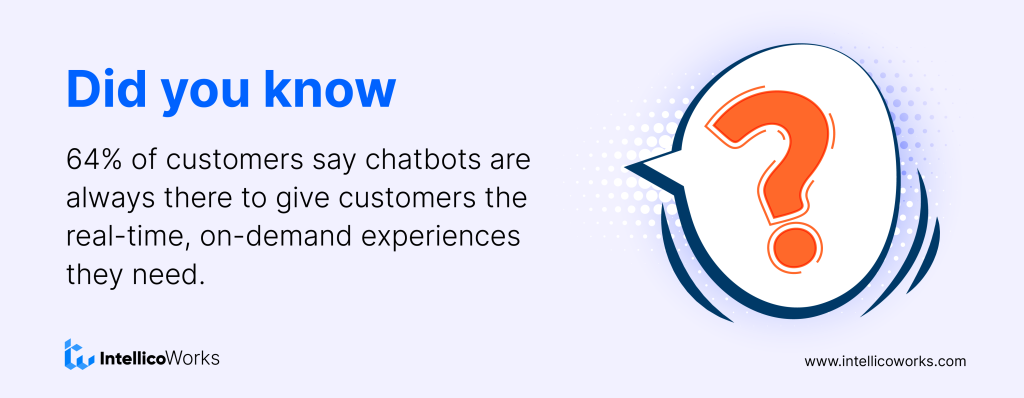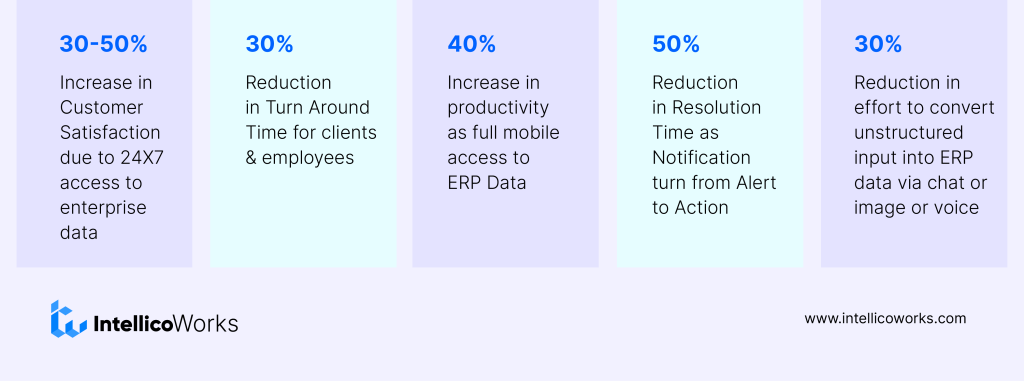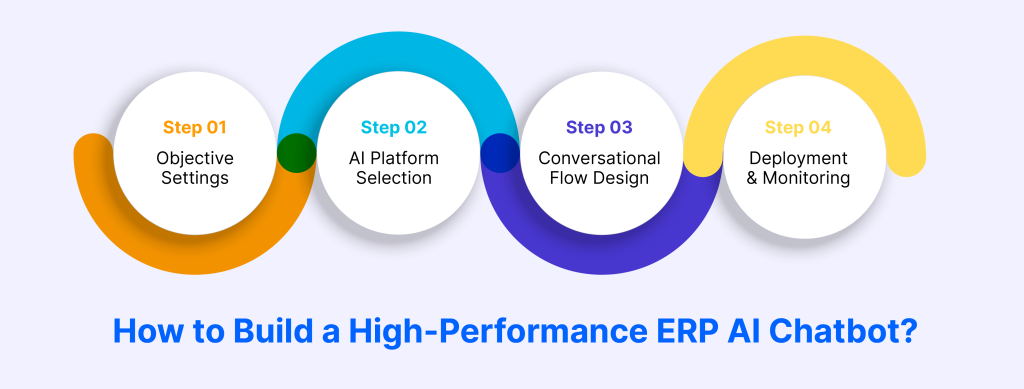When teams operate independently, it creates communication gaps that can lead to disorder. In contrast, when teams collaborate, they tend to be more efficient.
Chatbots, bots and virtual assistants are increasingly being integrated into businesses for customer-centric interfaces. These AI tools understand and analyze data from surroundings, acts and objectives that are set for them. Chatbots use NLP to create real-time conversations and provide feedback exchanges with users.
Research shows that chatbot interfaces will become standard across enterprise applications. The integration of AI in ERP bot will simplify how users interact with application data. With more advancements in machine learning and generative AI, large language models (LLMs) are making chatbot development easier, especially for ERP systems. It’s considerable that LLM technology behind chatbots can sometimes produce incorrect data which can be risky for safety information. This blog is about the ERP AI chatbot, what are some best ERP AI chatbots and what are the practical use cases of ERP chatbots to enhance systems:

An ERP chatbot is software with a conversational interface to a back-end ERP system. This has different meanings for employees and customers. For employees, ERP is used for scheduling information, retrieving supporting documents or generating a summary of data from multiple resources in the system. For customers, it is used to look up procurement information, estimate a shipping schedule or confirm the status of a return. With the rise of OpenAI ChatGPT service, ERP vendors were inspired to add similar capabilities to their ERP tools and platforms. This is done via APIs into cloud services, such as OpenAI services running on Microsoft’s Azure public cloud. In another way, it can also be done by vendors to customize or fine-tune other LLMs to work with their platforms. “This is one of the fastest-growing areas for conversational AI,” said Priya Iragavarapu, vice president of data science and analytics delivery.

Businesses integrate AI chatbots into ERP to enhance their operational efficiency and security.
But, it is important to know that chatbots rely heavily on accurate data. The human input can affect the chatbot output. They work and get trained on the provided data. If poor-quality data or missing data is entered, it will limit the accuracy of the results and increase the risk of AI hallucinations. In traditional ERP systems, it was enough to create an overarching enterprise scheme and work with various data to align development and business teams. However, in the modern world driven by AI, chatbots and LLMs, expand the ability to query the unstructured data in manuals and sheets.
It is therefore worthwhile to look into how these capabilities can be integrated with the massive amounts of structured data that are kept in the ERP system. The integration process between chatbot and ERP goes much smoother after the enterprise or business gets satisfaction with accuracy. Teams can implement chatbots in ERP with pre-built connectors, ERP-specific chatbot templates and conversational apps to provide faster user interactions and maintain data integrity and security which is necessary for businesses and enterprises. This process ensures that ERP in chatbots is not only functional but also effective and reliable.
Chabot’s integration into ERP systems can bring numerous benefits. One of the biggest benefits is improving the user experience and increasing productivity. It does not matter if the ERP is complex, conversational AI makes it easier to find appropriate information. The traditional ERP user interface model was done by templates to assist users. However, users need to converse with their tools instead of having to click on buttons and follow steps to get the information they want. Here is a breakdown of the benefits of ERP chatbots:
AI-powered ERP chatbots eliminate repetitive tasks that allow teams to give time to higher-value activities. Automating this system can free up critical resources. Consequently, companies will have employees to contribute more effectively to business objectives.
ERP chatbots can quickly respond to queries in a very accurate way. These chatbots can interpret and take action before potential issues arise. As a result, this proactive approach helps in maintaining smooth operations and preventing disruptions.
ERP AI Chatbots offer round-the-clock service. They ensure a consistent and reliable point of contact for customers and suppliers globally. As a result of integration, it enhances the overall service experience and supports efficient supply chain management.
ERP and AI chatbots can automate routine operations and repetitive tasks. AI chatbots cater to the needs of a modern workforce and enable humans to focus more on strategic and creative tasks and effort less on routine work. This not only increases productivity but also employee satisfaction.
AI ERP system chatbots can provide a seamless, available user experience on cross-platforms and different devices. In this way, they are flexible and this feature helps users to interact with business systems anywhere, at any time.

To start, it is important to define a clear goal or objective for the ERP AI chatbot. These goals include anticipating specific tasks for the chatbot like automating processes, providing data, or offering user assistance within the ERP system. The more clear the goal will be, the more clear the AI chatbot integration. It will ensure that the chatbot serves a meaningful purpose within the ERP framework.
It is important to choose the right AI platform. The technology stack and AI algorithm you select will seamlessly integrate with existing ERP infrastructure. There are many options to choose from like Dialogflow or Microsoft Bot Framework, or custom solutions using Python with libraries such as NLTK or spaCy. The selection is based on compatibility with the ERP system, the complexity of tasks the chatbot will handle, and scalability requirements.
The chatbot’s conversational capability construction involves detailed work. Identify common user inquiries for the chatbot to address. From there, designing responses and conversation paths that are coherent and contextually appropriate is essential. This step involves integrating Natural Language Understanding (NLU) components. NLU enables the chatbot to interpret user intent and context accurately. Additionally, the chatbot is tailored to recognize and respond using industry-specific terminology. As a result, it enhances its effectiveness in specialized ERP environments.
When you are done with development, integrate it into the ERP system. At this step, it is vital to gather the chatbot’s interactions for post-integration and continuous monitoring. This is done by collecting data on its performance, analyzing this data to identify areas for improvement, and making iterative adjustments to refine the chatbot’s responses and functionality. The ongoing refinement of the ERP AI chatbot ensures its effectiveness and relevance to users’ evolving needs. This approach has led to the successful implementation of numerous ERP solutions, demonstrating the effectiveness of a well-structured and methodically executed development strategy.
The integration of AI chatbots into ERP systems has revolutionized business interactions with their systems and stakeholders. These intelligent virtual assistants have underlying advanced AI and natural language processing. They are revolutionizing the way businesses interact with their ERP systems and stakeholders. Here are some of the use cases of AI chatbot ERP:
The intersection of AI chatbots and ERP systems innovated customer support operations. AI in customer experience has transformed the sector from addressing product inquiries and resolving issues to providing personalized recommendations and processing orders. However, these virtual assistants deliver customer service experiences around the clock. You can integrate AI automation in ERP and access real-time data. It is useful for organizations that can streamline support workflows, reduce response times, and enhance customer satisfaction levels.
It is important to set up new employees for the onboarding process. ERP AI chatbots streamline the onboarding process by giving guidelines to new hires through essential paperwork, training modules, and company policies. It is done by scheduling orientation sessions and answering common queries. These virtual assistants ensure a smooth and efficient onboarding experience. As a result, it allows employees to quickly acclimate to their roles and responsibilities.
AI chatbots enhance sales and marketing in ERP systems. From qualifying leads and providing product recommendations to facilitate sales transactions, they optimize marketing strategies, target relevant audiences, and drive conversions by leveraging AI-powered insights and predictive analytics.
Sustaining ideal stock levels and meeting consumer demand depends on effective inventory management. ERP AI chatbots automate queries, create reorder requests, and track shipments in real-time. It simplifies inventory-related tasks. Through ERP system integration and the application of predictive analytics, these virtual assistants help businesses increase supply chain efficiency, reduce stockouts, and optimize inventory levels.
AI chatbots integrated into ERP systems transform financial management practices by automating budgeting, expense tracking, invoicing, and financial analysis processes. These virtual assistants offer real-time insights into financial performance, identify cost-cutting opportunities, and ensure regulatory compliance.
HR departments rely on efficient processes to help their organizations grow. It includes talent acquisition and onboarding, performance management and employee engagement. ERP AI chatbots automate recruitment tasks like scheduling interviews, managing leave requests, and responding to employee inquiries. These virtual assistants allow HR departments to focus on strategic initiatives and employee development by providing personalized assistance and access to relevant information.
The integration of artificial intelligence (AI) into enterprise resource planning (ERP) systems has led to a new era of efficiency and automation. The core technologies are responsible for this digital transformation. Let’s check some of the underlying technologies that are making a difference in enterprises:
ERP chatbots use NLP algorithms to understand and interpret human language. They analyze user queries, identify intent, and extract relevant information to formulate responses. This enhances communication between users and systems, thereby delivering an intuitive experience.
AI ERP chatbots use machine learning techniques like supervised learning and reinforcement learning to continuously improve and adapt over time. These virtual assistants refine responses and decision-making processes based on feedback and data analysis. This enhances the chatbot’s accuracy, relevance, and effectiveness in addressing user queries and tasks.
AI for ERP system integration enables chatbots to access data and execute commands effectively. They use APIs and frameworks to interact with finance, inventory management, human resources, and customer relationship management modules. This provides users with timely and accurate information for efficient tasks.
AI chatbots in ERP use context understanding to maintain coherence and relevance in conversations. They analyze user preferences, transactional history, and previous interactions to tailor responses and actions. This approach ensures personalized, meaningful interactions, anticipating user needs, and delivering superior user experiences.
ERP in AI chatbots continuously improves and optimizes. It uses feedback mechanisms and iterative development cycles to analyze user feedback, identify areas for improvement, and incorporate enhancements to enhance performance. This culture of continuous improvement allows ERP chatbots to become more efficient, accurate, and adept at serving user needs.
Here are some of the best platforms that have distinguished themselves through robust features, seamless integration capabilities, and outstanding user support:
Botpress the AI chatbot platform is user-friendly and integrates large language models like GPT-3 and GPT-4 for personalized chat experiences. It supports over 100 languages and offers GPT-native tools for conversation automation. It features a visual builder for conversation design and an emulator and debugger for efficient testing. It offers a low-code tool, free pricing models, a drag-and-drop studio, global deployment capability, and community support.
Kore.ai is an AI chatbot platform designed for enterprises and small businesses. It offers support for over 120 languages and channels, pre-built bots for various industries, advanced dialogue management, and integration with large language models. It focuses on security, compliance, and customer service optimization, and provides a free trial option.
Google’s AI chatbot platform, Dialogflow CX and Dialogflow ES, offers 24/7 customer self-service through virtual agents and IVR systems. It features generative AI agents, a visual flow builder, omnichannel implementation, and state-based data models. It emphasizes ease of management and scalability, supporting various use cases like voice bots and chatbots.
Our expert AI development team integrates advanced features into your chatbot. We provide AI chatbot development services that facilitate easier adoption among your employees, maximizing the efficiency gains from chatbot integration. We also offer continuous support and updates. As AI technology evolves, we ensure your chatbot remains at the forefront, incorporating the latest advancements for improved performance. We also stay vigilant by ensuring compliance with all relevant data protection regulations and safeguarding your business information.
The fusion of AI chatbots and ERP systems represents a paradigm shift in business operations. AI ERP Chatbots offer unparalleled efficiency, productivity, and customer satisfaction. Enterprises and organizations can use AI-driven automation to streamline processes, drive innovation, and gain a competitive edge in today’s dynamic marketplace. It is not about adopting new technology; it’s about transforming the way businesses operate and thrive in the digital age.
Enhance Your Operations with Tailored AI Chatbot Solutions!

Talk to us and let’s build something great together
A Subsidiary of Vaival Technologies, LLC
IntelliCoworks is a leading DevOps, SecOps and DataOps service provider and specializes in delivering tailored solutions using the latest technologies to serve various industries. Our DevOps engineers help companies with the endless process of securing both data and operations.
Ops
Cloud
AI & ML
Copyrights © 2023 byIntellicoworks. All rights reserved.